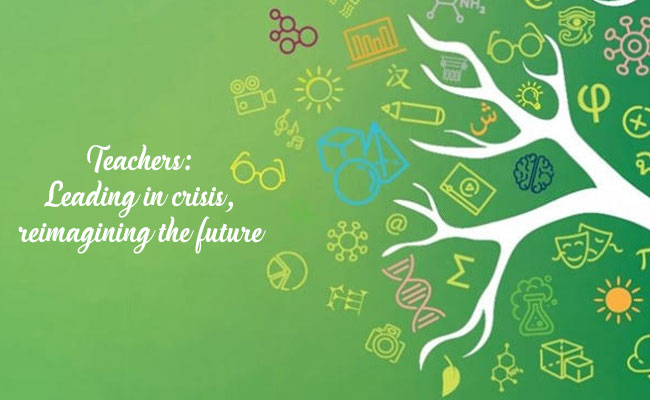On 5 October 1996, a special intergovernmental conference was held on the status of teachers, which put forward some major issues including the responsibilities, rights, pre-service preparation, advance education, hiring, retirement and teaching-learning conditions. Thenceforth, in commemoration of that day, October 5 is celebrated annually across the globe as the World’s Teachers Day.
Under the theme of this year ‘teachers at the heart of education system’, the World’s Teachers Day 2021 is focusing on to provide supports to the teachers, so they are equipped enough to make necessary contributions for this post-covid recovery phase. What will be highlighted this year are the impacts caused by the COVID-19 on teaching profession and necessary skillset needed for the teachers to unleash their full potentials so that they can make meaningful contributions in the recovery process and attain global education agendas by 2030.
Today, teachers are more needed than ever before. Being into the pandemic for over one and half years, we have witnessed the roles played by the teachers to minimize the learning gaps. They had to improvise their professional practices in many ways- from transitioning into online teaching, reaching out to students who are hard to reach, catering the lesson in a way that meet the diverse socio-emotional needs of the class to providing psychological supports and maintaining a direct communication with the guardians and other stakeholders. In doing all there, they had to go to an extra mile, took on duties beyond their usual responsibilities, and on top of everything- they took the ownership of their responsibilities and exhibited a sense of community.
Discussions are taking place in different communities about a renewed appreciation of teacher for their unconditional and relentless efforts for building a resilient and more harmonious society. However, a recent report released by the UNESCO in 2021 found that the current resource allocation and policy measures do not reflect such high regards for the teachers. Also, the global pandemic has exposed some major challenges for this profession- extra workloads, payment cut-off, and limited opportunities for professional development. In addition, teachers’ occupational safety issues have not be addressed adequately. According to UNESCO, 21 out of 197 countries have only prioritized teachers for the vaccination plans. Apart from this, from a broader lens, teachers’ high regard is not reflected in the honorarium, social standing, and even in the financing for education- let alone their involvement in the decision-making. 
Plethora of research studies have documented that a teacher is one of the most influential in-school factors that can directly have positive influence on students’ academic performance and overall well-being. Yet, they remain underappreciated. Hence, this career path is not an appealing one to opt for by the top tertiary graduates. One of the major reasons that renders teaching profession less appealing among the youths are the remuneration and working conditions, which many nations do not stand a comparison with other professions that require almost the same level of responsibility and education. Also, the ways the education and learning system are monitored, including the mechanism for quality assurance, have constrained the scope for teachers to practice autonomy, flexibility and leadership causing a contradiction with the very business that they are called to do.
This situation is being exacerbated by the shortage of teachers particularly at the primary and secondary level. The projections from the Institute of Statistics of UNESCO shows that 69 million teachers will be required in order to achieve the sustainable development goals for education by 2030. This data did not count the pre-primary and the tertiary level education where the shortage of educators is also a major issue.
After an 18 months-long school closure, lately our schools have started welcoming students, and in this very moment the role of teachers are enormous. For getting the best out of this recovery phase, it is high time we restore the social position, dignity, work conditions, remuneration, as well as participation in the decision-making. We should also work on the policy reformations, which has to be context-specific and teachers-friendly. Teacher professional development needs to be accelerated- supporting them where they are struggling and acknowledging for what they are good at. A transparent participation channel should be in place for teachers to participate in the governance and decision-making process. Also, a good working conditions need to be ensured that is free from biased, prejudices and discriminations.
Finally, instead of just setting expectations for teachers to be creative and autonomous, we should abolish anything that is contradictory and put in place those things that are supportive to a better work environment. Being failed to so may cause great loss for country like us whose only tool for prosperity and progress is education. Therefore, in this World’s Teachers Day, let us commit to create a society that would uphold the dignity of teachers and help them build a more resilient and prosperous nation.

About Writer: Saykat Biswas is working as a Deputy Manager in the Skills Development Programme at BRAC.
































